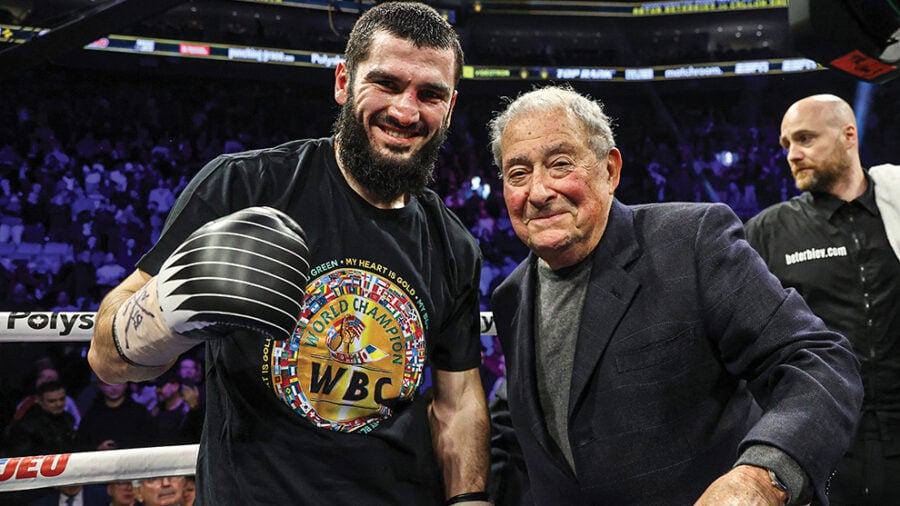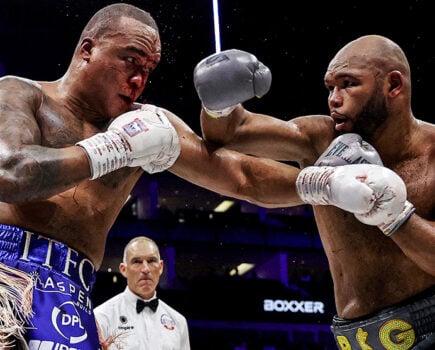By Matt Christie
EDDIE HEARN’S reaction to Artur Beterbiev’s atypical finding following VADA tests conducted on December 6 was typical of any promoter. Typical, too, was Bob Arum’s reaction to Hearn. Given the form guide of both marketeers, one might conject that had it been Callum Smith returning an atypical finding, the reactions of Hearn and Arum would have been reversed. But still typical, nonetheless.
That’s not a criticism of either because, in light of Beterbiev’s test result, both did what they’re in place to do; Hearn had Smith’s back when he voiced concern about Beterbiev, and Arum had Beterbiev’s when he said such concern was nonsensical. Each could be deemed typically contradictory to previous reactions to test results and therefore it was typically difficult to take either opinion too seriously.
The most important thing to consider is this: Atypical findings do not constitute test failures and thus ordinarily they wouldn’t be made public knowledge. Boxers have gone into fights in the past on the back of similar atypical results without anyone bar those involved being aware.
On this occasion, journalist Kevin Iole broke the story on January 10 after Team Beterbiev suggested that Team Smith was planning to leak the information in an effort to circumvent confidentially rules.
So, what is an atypical finding? Very simply, it means that an abnormality – as opposed to a substance – was detected at the time of testing and further testing is required. In Beterbiev’s case, there were heightened levels of human growth hormone (HGH) and testosterone metabolite 5D-androstanediol detected in two separate samples (blood and urine). Such increases can either be natural or artificially induced.
For further context, an ‘adverse finding’ – widely known as a test failure – occurs when a substance or the markings of has been detected. Again, that was not the case with Artur Beterbiev. According to the World Anti-Doping Code, an atypical finding is defined as “A report from a WADA-accredited Laboratory or other WADA-approved Laboratory which requires further investigation.”
A clue to the meaning of atypical findings is in the wording. Atypical, according to the Oxford Dictionary, is the opposite of typical. Not typical; not conforming to the type; irregular; abnormal. Artur Beterbiev, at 38 years old and 20-0 (20) and seemingly indestructible, is every inch atypical.
Dr Margaret Goodman, President of VADA, told Boxing News: “Atypical findings are fairly common in PED testing and do not constitute an adverse test result. They can result from various causes. Atypical findings generally warrant the collection of further samples. But no negative inference should be drawn from an atypical finding in and of itself.”
According to the 2021 World Anti-Doping Agency (WADA) statistics, 312 of 241,430 samples had atypical findings. Not unusual but rare enough, at less than one per cent, to warrant investigation. Which, of course, is what happened with Beterbiev. Further tests were carried out on December 15 (urine), December 21 (blood and urine) and January 3 (blood), all of which were negative.
A grey area, however, is that VADA’s role is not, and never has been, to decide why something is present or why something is heightened. The role of VADA, very simply, is to test athletes and report the findings. Therefore, though VADA can verify that Beterbiev’s levels were normal in subsequent blood and urine tests, it is not their job to investigate why they were not on December 6.
The World Boxing Council (WBC) statement read, in part: “It is widely known that there is no way to identify conclusively the source of an atypical finding. In the case of 5B-androstanediol, it has been reported that the atypical finding can be due to the rate certain people’s bodies metabolize naturally occurring testosterone-type compounds.
“In the case of HGH, WADA provides with specific criteria to its accredited laboratories to report HGH levels as atypical or adverse findings. In Beterbiev’s case, the level of HGH detected did not meet the WADA criteria for an adverse finding, and therefore constitutes an atypical one.
“Because the origin of an atypical finding is very difficult to identify, WADA recommends further testing to monitor any abnormal variations in testosterone levels. In Beterbiev’s case, the follow up tests were not only negative, but yielded consistent testosterone levels without any spiking that could have suggested exogenous intake of performance enhancement substances. In short, Beterbiev’s testing protocol and results therein lead only to one conclusion: there are no adverse findings. In light of the testing measures taken and all results obtained, the WBC has not and will not take any adverse action in this matter.”
In atypical findings, it is possible that athletes illegally boosted their HGH or used other substances in conjunction with it to enhance performance or aid recovery. The Quebec Commission and all sanctioning bodies involved (WBC, IBF and WBO) were satisfied this was not the case.
HGH and testosterone levels can naturally spike after strenuous exercise or abnormal activity. Also, the American Journal of Physiology concluded after conducting a study of 11 healthy men that even sleep deprivation “is invariably associated with a robust increase in GH secretion.”
The problem is nobody can say for sure what caused the heightened levels on December 6.
“If this was my show and this was my fighter,” Hearn told Boxing News the day before Beterbiev thrashed Smith in seven rounds, “there would be uproar from the whole boxing world to cancel the show immediately. We have had no proof that they [heightened HRH levels] occurred naturally. We have just been told that can happen, that’s all. If he [Arum] thinks we shouldn’t be working on behalf of our fighter to make sure we’ve got peace of mind for the safety of our fighter… All we want to say to VADA is, if you’re categorially sure that this is not due to ingesting illegal substances – and this is not an accusation to Artur Beterbiev – then we’re happy. I don’t believe they [VADA] can do that.”
Hearn’s view that had it been a Matchroom fighter returning atypical findings then there would have been ‘uproar’ might be true. That, however, is purely a consequence of Hearn himself, and specifically his handling of certain relatable situations in the past. Consistency – or lack of – speaks volumes, after all.
Was Beterbiev taking illegal substances? If we look at all the tests conducted, there isn’t any evidence whatsoever to suggest foul play. Does it mean there wasn’t any? More than likely, yes. But typically, in this atypical sport, we will never know.

Artur Beterbiev nails Callum Smith with a jab (Getty Images)
IT was with great sadness to learn about the death from cancer of Karen Knight, a trustee of Ringside Charitable Trust. She passed away on January 12.
Karen dedicated her final years to RCT and worked tirelessly for the cause. She also played a huge role in the creation and upkeep of the British Boxing Hall of Fame. An unsung hero who was a pleasure to be around, Karen was always funny, honest, and brave.
She only discovered she was suffering from cancer a few days before her death. Her final address on Facebook (January 3) read: “Since my stay in hospital I have been diagnosed with a broken arm, further pain revealed lung nodules thought to be harmless but were not.
“I have lung cancer that decided to party and spread to the spine. I have requested no time frame etc. My body will decide that. Until then, positive vibes only – no negative. I am treating it with the contempt it deserves. My humour, very often black, will get me through, so life as ‘normal’.”
Karen, an inspirational figure, is already sorely missed. All at BN send our condolences to her family, husband Terry, and her many friends.






